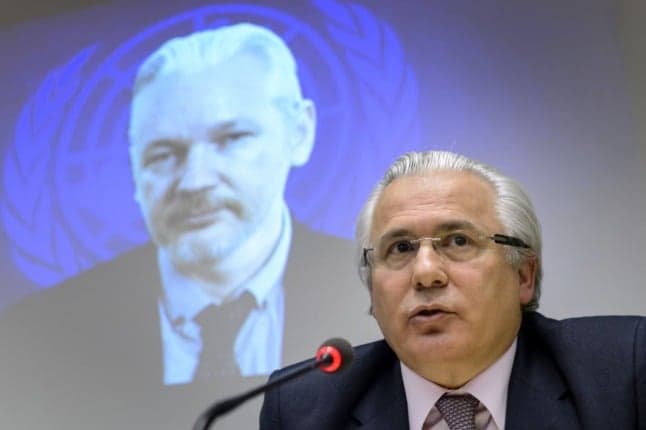UN committee slams Spain for 'arbitrary' trials of former judge

Trials of Spain's famous ex-judge Baltasar Garzón over his handling of two high-profile cases were arbitrary and did not respect principles of judicial independence, a UN committee said Thursday.
Independent experts on the Human Rights Committee concluded that the criminal proceedings against Garzón nearly a decade ago, and especially his conviction in one case for wilful abuse of power were "arbitrary and unforeseeable".
The committee, whose opinions and recommendations are non-binding but carry reputational weight, said the ruling was its first condemning a state for using criminal law against a judge.
Garzón first won global renown by trying to extradite Chile's former dictator Augusto Pinochet from London in 1998 and is now a lawyer defending high-profile clients like Julian Assange.
He was criminally prosecuted in early 2012 for alleged abuse of power in two separate cases that critics charged were politically motivated.
One case was brought over his decision to open a probe into the disappearance of tens of thousands of people during Spain's 1936-39 civil war and General Francisco Franco's subsequent dictatorship.
Garzón, who was accused of violating an amnesty agreement, was acquitted in that case.
But he was convicted in a nearly simultaneous abuse of power trial over a decision to order wiretaps in a probe into a corruption scandal involving members of the conservative party, and was handed an 11-year suspension from the bench.
Garzón filed a complaint with the UN committee in 2016, alleging he had been a victim of multiple rights violations.
The committee, made up of 18 independent experts who monitor countries' compliance with the International Covenant on Civil and Political Rights, concluded there had been no justification for bringing the judge to trial in either case.
If there had been judicial errors as claimed by the state, they "should have been corrected by a review before a higher court and not through the criminal prosecution", the experts said.
The committee also found that Garzón's right to be tried by an impartial tribunal had been violated, since two trials took place almost simultaneously and several Supreme Court judges participated in both cases, despite his request they be recused.
It called on Spain to expunge Garzón's criminal record and provide him with "adequate compensation".
"Judges should be able to interpret and apply the law without fear of being punished or judged for the content of their decisions," committee member Jose Santos Pais said in the statement.
"This is essential to preserve judicial independence."
Comments
See Also
Independent experts on the Human Rights Committee concluded that the criminal proceedings against Garzón nearly a decade ago, and especially his conviction in one case for wilful abuse of power were "arbitrary and unforeseeable".
The committee, whose opinions and recommendations are non-binding but carry reputational weight, said the ruling was its first condemning a state for using criminal law against a judge.
Garzón first won global renown by trying to extradite Chile's former dictator Augusto Pinochet from London in 1998 and is now a lawyer defending high-profile clients like Julian Assange.
He was criminally prosecuted in early 2012 for alleged abuse of power in two separate cases that critics charged were politically motivated.
One case was brought over his decision to open a probe into the disappearance of tens of thousands of people during Spain's 1936-39 civil war and General Francisco Franco's subsequent dictatorship.
Garzón, who was accused of violating an amnesty agreement, was acquitted in that case.
But he was convicted in a nearly simultaneous abuse of power trial over a decision to order wiretaps in a probe into a corruption scandal involving members of the conservative party, and was handed an 11-year suspension from the bench.
Garzón filed a complaint with the UN committee in 2016, alleging he had been a victim of multiple rights violations.
The committee, made up of 18 independent experts who monitor countries' compliance with the International Covenant on Civil and Political Rights, concluded there had been no justification for bringing the judge to trial in either case.
If there had been judicial errors as claimed by the state, they "should have been corrected by a review before a higher court and not through the criminal prosecution", the experts said.
The committee also found that Garzón's right to be tried by an impartial tribunal had been violated, since two trials took place almost simultaneously and several Supreme Court judges participated in both cases, despite his request they be recused.
It called on Spain to expunge Garzón's criminal record and provide him with "adequate compensation".
"Judges should be able to interpret and apply the law without fear of being punished or judged for the content of their decisions," committee member Jose Santos Pais said in the statement.
"This is essential to preserve judicial independence."
Join the conversation in our comments section below. Share your own views and experience and if you have a question or suggestion for our journalists then email us at [email protected].
Please keep comments civil, constructive and on topic – and make sure to read our terms of use before getting involved.
Please log in here to leave a comment.